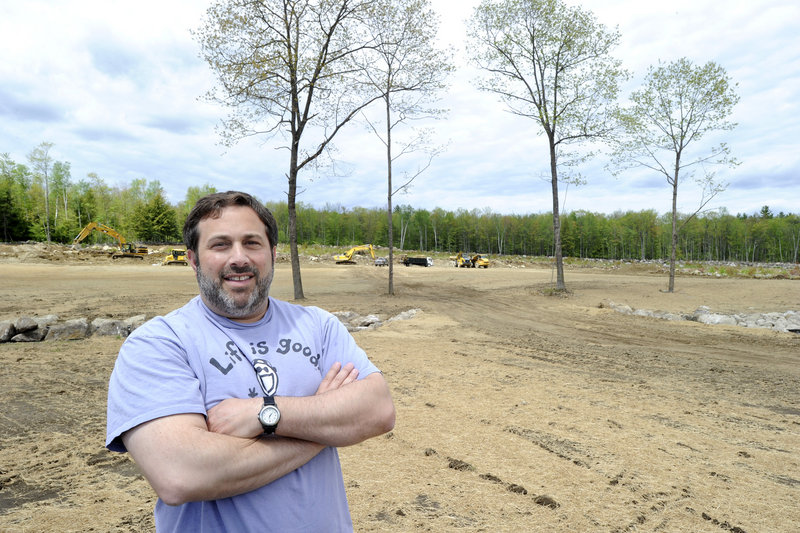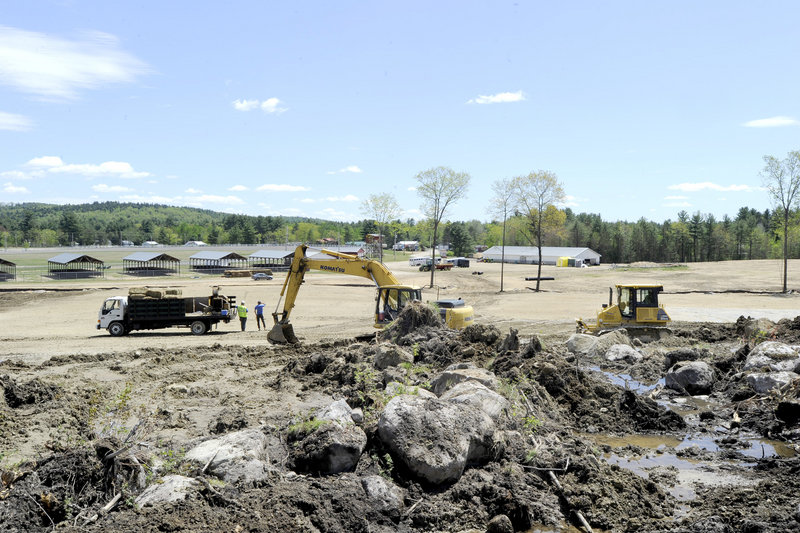Linda Walbridge likes music. She has seen Furthur, the rock band formed by Grateful Dead legends Phil Lesh and Bob Weir. But Walbridge won’t be focused on the performance this Independence Day, when Furthur headlines the Nateva Music & Camping Festival at the Oxford Fairgrounds.
Promoters hope to attract 15,000 people to this first-time event in the Oxford Hills. Walbridge, who heads the Western Maine Economic Development Council, will be trying to transform the publicity and money left behind by the three-day festival into regional growth.
Walbridge and other local officials want Nateva to be the first of a series of annual summer concerts at the fairgrounds, creating a critical mass of entertainment that will bring more people, and hospitality businesses, to job-starved Oxford County.
“The Oxford Hills needs to become a destination spot,” she said.
Walbridge and her colleagues are on the right track, University of Maine researchers say. As summer approaches, Maine is hosting a growing list of music festivals and events, including Nateva and the Saddleback Mountain Bluegrass Festival. The key to capitalizing on their economic impact, researchers say, is to build them into annual events and use the opportunity to showcase other area attractions for visitors.
A 2008 study of the American Folk Festival in Bangor, for instance, pegged the overall economic impact at nearly $10 million, much of it through spending at restaurants, gas stations and hotels. It also determined that a fifth of the 95,626 visitors came to Bangor specifically for the festival.
“You have a captive audience for a short period of time and you really want to roll out the marketing effort,” said Charles Colgan, associate director of Maine’s Center for Tourism Research and Outreach.
Maine has a long history of using music and culture to bring money into the state, Colgan said, pioneered by its summer theaters and festivals. But organizing a giant concert event featuring popular music is a more recent venture in Maine. In 1997, the widely-regarded jam band Phish drew 65,000 fans to The Great Went at the former Loring Air Force Base in Limestone. A similar number came a year later for Phish’s Lemonwheel festival.
Phish brought a brief spurt of cash, and killer traffic jams, to Maine, Colgan said. contrast, Nateva’s organizers have spent nearly a year in the Oxford Hills, trying to build lasting relationships and infrastructure.
“The test of this thing will be its longevity and ability to be built into the summer culture of the Norway-South Paris area,” he said.
Nateva is being spearheaded by Frank Chandler, a 47-year-old Boston-area music lover who most recently served as a vice president and sales director at Boston Capital Corp. Chandler has never promoted a concert. But he’s surrounding himself with people who have, and through friends and family, is raising enough money to stage an event that now features more than 30 bands.
The payback will come through tickets. Weekend passes, which until two weeks ago were being discounted for advanced sales, now range from $249 to $229 per person. Chandler declined to say how many tickets he has sold, but said he expects a third of the fans to come from Maine.
Chandler went to summer camp in Maine. His parents have a home in Ogunquit, and he owned a gallery in Portland’s Old Port in the 1980s. His ties to Maine led him to conclude that the state can support a major music event, if it’s close enough to Boston. He briefly considered the Cumberland Fairgrounds, but said he found Oxford officials more receptive.
“They like the idea of 15,000 people coming to town and spending money,” he said.
Chandler estimates he’ll directly hire 300 people for the show — electricians, security guards, contractors, maintenance workers. And he figures he’ll spread some money around the community. He needs 300 portable toilets; four miles of fencing; catering services to prepare three meals a day for performers, and 400 employees and volunteers.
He rented all 32 rooms in Norway’s Inn Town Motel. He wants to lease up to 40 school buses.
“We’ll pay enough for the school district to hire a teacher,” he said.
Chandler has made a point of trying to find local workers. He asked one of the security companies, Portland-based Crowd Management Consultants of Maine, to hire Oxford County residents, when possible.
The company will need 107 workers for the event and Mike Bogosian, the owner, is working with the local career center to identify at least 50 residents who can be trained for the $9.50-an-hour jobs.
“My intention is to get as many people as I can from up there,” Bogosian said.
Some money will spill over into other communities. For example: The Oxford Hills has limited lodging. To offer options to festival-goers who don’t camp, Chandler has negotiated discounts with the Marriott and the Holiday Inn Express at Sable Oaks in South Portland. Shuttle buses will ferry fans back and forth.
But most of the spending will take place in the Oxford Hills. If the University of Maine study is an indication, the largest percentages will go to food and gasoline sales. The most enduring impact, though, based on conclusions in the American Folk Festival study, will come from using the event to promote other area attractions. That can have the effect of extending visitors’ lengths of stay and increasing an area’s visibility as a tourist destination.
That’s what Walbridge is shooting for.
The Oxford Hills lost many manufacturing jobs during the recession. The area unemployment rate is hanging above 11 percent, a few points above the state average. Some residents hope a casino will be developed in the area, a controversial proposal that will come before Maine voters in November. Economic development officials have no control over that, Walbridge said.
“We can’t count on it,” she said. “We can’t plan on it to build capacity.”
The Oxford Hills, Walbridge said, needs a larger hotel to handle bus tours. That could entice more leaf peepers to explore the area, instead of just passing by on Route 26 on their way to the White Mountains. Walbridge envisions a critical mass of attractions, including the Oxford Plains Speedway, the growing Norway Arts Festival, the Oxford County Fair and a summer concert series.
The fairgrounds owner has been talking to promoters about other possible events at the 90-acre site. Meanwhile, Chandler has a long-term lease and is making improvements that will prepare the fairgrounds for repeat performances.
Those preparations stopped temporarily a couple of weeks ago, after the festival ran into trouble for not having the proper permits from the town of Norway, where part of the grounds are located, for site clearing and outdoor gatherings. After-the-fact permit applications are now pending at town hall, and the problem is not expected to interfere with the festival.
As summer approaches, officials in the Oxford Hills have a lot riding on Nateva. If it’s a success, Nateva will do more than provide a rush of minimum-wage jobs, Walbridge said. It can pave the way for long-term business attraction and development in an area desperate for living-wage positions.
“That’s what these concerts are,” Walbridge said. “They’re baby steps to getting living-wage jobs.”
Staff Writer Tux Turkel can be contacted at 791-6462 or
tturkel@pressherald.comNateva director Frank Chandler said he also considered the Cumberland Fairgrounds for the event, but said he found Oxford officials more receptive. “They like the idea of 15,000 people coming to town and spending money,” he said.
Send questions/comments to the editors.




